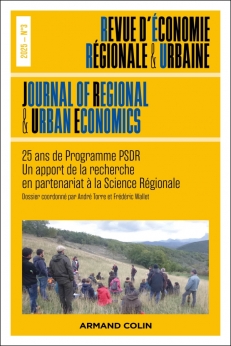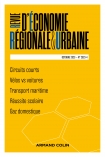
REVUE D'ÉCONOMIE RÉGIONALE ET URBAINE (3/2025)
Pour acheter ce numéro, contactez-nous
Recevez les numéros de l'année en cours et accédez à l'intégralité des articles en ligne.
Comment favoriser l’émergence et la diffusion des connaissances dans des zones périphériques souvent considérées comme moins innovantes en raison de leur éloignement géographique et de leur moindre capacité technologique ? Pendant 25 ans, le programme PSDR (Pour et Sur le Développement Régional) s’est attaché à combler cet écart par la construction d’une approche collaborative et pluridisciplinaire tenant compte des particularismes des territoires ruraux. Cet article vise à présenter les apports de ce programme de recherche à la création et à la diffusion des connaissances en zones rurales. Nous présentons les principes de base du programme, ainsi que ses contributions principales, en termes de gouvernance des terres agricoles, d’attractivité et de bien-être territorial, de transition agroécologique des territoires, de systèmes alimentaires territorialisés, ainsi que de bioéconomie et d’économie circulaire. Nous insistons également sur la nécessité de combiner les innovations technologiques, organisationnelles et territoriales et d’impliquer les partenaires locaux dans la conception et l’élaboration des programmes de recherche. C’est à ce prix que les zones rurales peuvent produire de nouvelles connaissances bénéfiques aux communautés locales et transférables à d’autres secteurs ou territoires.
How can we encourage the emergence and dissemination of knowledge in peripheral areas often considered less innovative due to their remoteness and less technological creativity? For 25 years, the PSDR (For and On Regional Development) program has endeavored to bridge this gap by building a collaborative and multidisciplinary approach taking into account the particularities of rural territories. This article aims to present the contributions of this research program to the creation and dissemination of knowledge in rural areas. The article quickly outlines the evolution of the program through these four major phases, before presenting the management systems that structure it. We then recall some important results from the scientific literature relating to the development issues of rural territories and the role played by the production of knowledge before moving on to the main contributions of this research. Five thematic fields are covered. The evolution of agricultural practices and land governance near cities highlights the changes that have occurred in recent years in an attempt to preserve spaces in a context of city expansion. The links between attractiveness and territorial well-being underline the specific expectations towards rural territories. The agroecological transition of territories emphasizes innovative agricultural practices and obstacles to change, most often within the framework of collective experiments. Work on territorialized food systems analyzes the strategies at work over the past ten years and the governance mechanisms that underpin them. Finally, the bioeconomy and the circular economy are mainly approached from the angle of its social acceptability and technical and organizational conditions. We also insist on the need to combine technological, organizational and territorial innovation and to involve local partners in the design and development of research programs. On these bases rural areas can produce new knowledge that benefits local communities and can be transferred to other sectors or territories.
